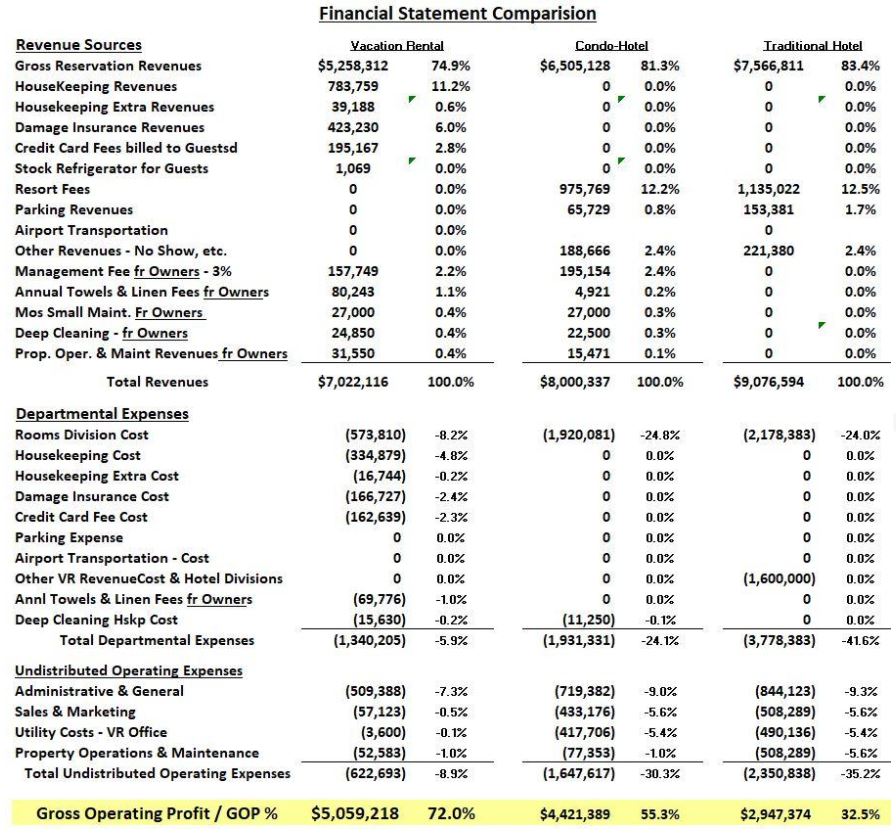Vacation Rental Metrics & Margins Matter (Part 1)
As their hotel brethren before them, the Vacation Rental industry is now establishing their own unique set of metrics and margins. These averages are benchmarks that Vacation Rental owners can look to, to assess their financial position and performance.
Gross Operating Profit
GOP is a key metric that tells us how well we're performing operationally. Typically,
- Gross Operating Profit for Vacation Rental runs 68% - 72%
- Gross Operating Profit for Limited Service hotels runs 46% - 52%
- Gross Operating Profit for Full Service hotels runs 29% - 33%
The leading question here is why there is such a large variance between Vacation Rental and Traditional Hotel Gross Operating Profits.
Revenue Types
Vacation Rentals and Condo Hotels have additional Revenue Types that come from (1) guests and (2) "homeowners" in rental programs. In the illustration above, 20.5% of revenues collected from guests came from Revenue Types not charged by hotels. To that, add another 4.6% of revenues collected from "homeowners" in rental programs. That's 25.1% in additional Revenue Type revenues.
TIP: Revenue Types charged to guests often depend on what your competitors are charging. Please note that I have not used a number of Revenue Types that Vacation Rental Companies may be charging for (i.e. Resort Fees, Parking Fees, etc.) here.
My observation on the top line on the financial statement "Gross Reservation Revenues", is that a revenue channel mix that includes Vacation Rental sites (i.e. AirBNB, VRBO, etc.) will typically bring in a lower Average Daily Rate and a higher Average Length of Stay. Hence the difference you see in that line above compared to hotels.
In the illustration above, in the left column entitled "Vacation Rentals" I exclude (1) housekeeping and (2) towel & linen COSTS because (a) guests pay for them and (b) "homeowners" pay for them, respectively.
TIP: Housekeeping labor and Towels & Linens are the highest line items on a hospitality financial statement.
Administrative & General costs are reduced by credit card fees; because guests pay for them.
What we refer to as "Sales & Marketing Division" costs in hotels, is largely non-existent in Vacation Rentals, since groups and corporate business cannot typically be entertained because there is no common meeting or banquet space. With that said, Vacation Rental businesses should spend on promotion and I've included those estimated expenditures here.
Utility, Cable TV, Wi-Fi and such are costs typically paid for by the "homeowner".
NOTE: Please note that I used one $1,600,000 line item under "Traditional Hotels" to account for all the different divisions in a hotel that have no relevance to Vacation Rental operations.
Profit Center
Vacation Rentals have a number of Profit Centers that traditional hotels DON'T.
They include, but aren't limited to (1) housekeeping service, (2) selling damage insurance in lieu of taking security deposits, (3) collecting credit card fees from guests, (4) stocking refrigerators, (5) arranging transport from the airport, (6) collecting maintenance fees from "homeowners" and (6) taking on maintenance jobs for "homeowners" on interiors.
Traditional On-Line Travel Agents
One area in which the Vacation Rental industry has significant benefits over the hotel industry is in cost savings on on-line travel agents. Whereas hotels have traditionally paid 15%-21% to advertise here, Vacation Rental sites are charging 3%-7% and, the guest pays for an additional portion. As you can see, this is a vast savings from Vacation Rentals to hotels.
In the next 2 features on Vacation Rental Metrics & Margins I'll discuss (1) remaining costs from Gross Operating Profit to Profit and (2) the most important Vacation Rental Metrics and how to use them.
"The Definitive Study of Vacation Rentals" By Richard B Evans has been published and is available on Amazon books at http://amzn.to/2iILtcg for $39.95.
Richard B Evans
President of Revenue Report Card LLC
(954) 290 - 3567

